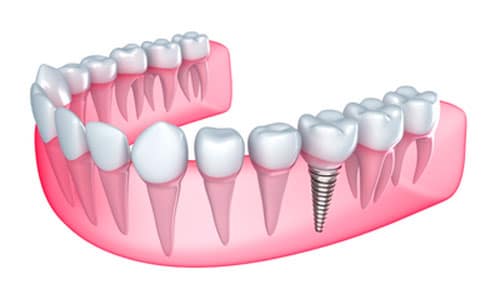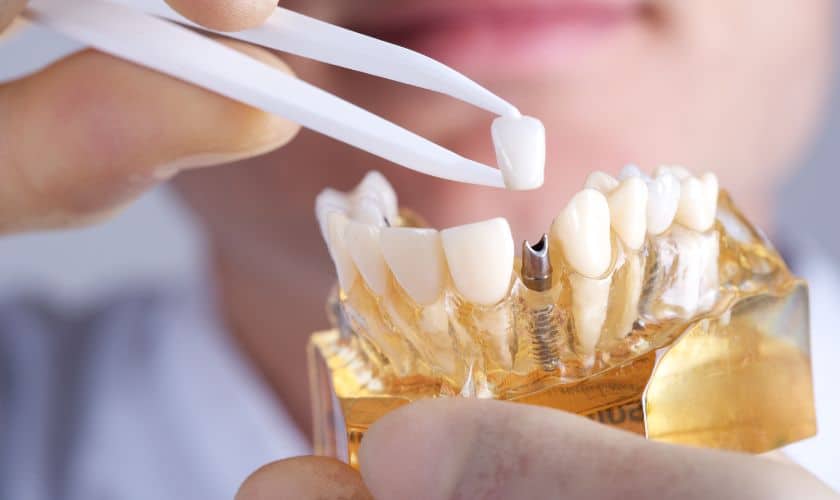
This is a common fear encountered by most patients before dental implants are installed. However, there are a number of patients who believe very little to no discomfort is felt during or after the procedure if proper care is taken.
Understanding Dental Implants
Before delving into the pain aspect, let’s first understand what dental implants are and how they work. Dental implants are artificial tooth roots made of biocompatible materials, typically titanium, that are surgically placed into the jawbone. These implants serve as a strong and stable foundation for a prosthetic tooth or crown to be attached, effectively replacing a missing tooth.
The Dental Implant Procedure
The dental implant procedure is typically performed in several stages, and the extent of pain or discomfort experienced can vary from person to person. Here’s a breakdown of the key stages:
- Consultation and Planning: Before the actual implant surgery, you will have a consultation with your periodontist. During this phase, a comprehensive examination, including X-rays and 3D scans, will be conducted to assess the condition of your jawbone and determine the best treatment plan for your specific case.
- Implant Placement: The surgical placement of the dental implant is a crucial step. Local anesthesia is administered to numb the area, ensuring that you do not feel any pain during the procedure. The implant is then carefully inserted into the jawbone. While you may feel some pressure or vibrations, the procedure itself is virtually painless due to the local anesthesia.
- Healing and Osseointegration: After implant placement, a healing period is essential for osseointegration to occur. Osseointegration is the process by which the implant fuses with the surrounding bone tissue. During this phase, some discomfort and mild pain may be experienced, but it is typically manageable with over-the-counter pain medications.
- Abutment Placement: Once osseointegration is complete, an abutment, a small connector piece, is attached to the implant. This step is relatively simple and is performed under local anesthesia.
- Crown Placement: Finally, a custom-made dental crown is secured onto the abutment, completing the restoration process. This stage is typically painless, as there are no nerve endings in the artificial tooth.
Managing Pain and Discomfort
It’s important to note that the pain associated with dental implants is generally mild and manageable. Here are some strategies to help you cope with any discomfort:
- Pain Medication: Over-the-counter pain relievers like ibuprofen or acetaminophen are usually sufficient to alleviate post-operative pain. Your periodontist may also prescribe stronger medications if needed.
- Cold Compress: Applying a cold compress to the surgical area can help reduce swelling and relieve pain.
- Rest and Recovery: Rest is crucial during the initial healing period. Avoid strenuous activities and follow your periodontist’s post-operative instructions carefully.
- Soft Diet: Stick to a soft diet to minimize strain on the surgical site. Avoid hot, spicy, or crunchy foods during the initial days.
- Good Oral Hygiene: Maintaining excellent oral hygiene is essential to prevent infection and promote a smooth healing process. Follow your periodontist’s instructions for cleaning the implant site.
The Emotional Aspect
While the physical discomfort associated with dental implant surgery is manageable, it’s worth acknowledging the emotional aspect of the procedure. Many patients may experience anxiety or fear leading up to the surgery. It’s natural to have concerns about any medical procedure, especially one involving the mouth.
To address these emotional concerns, it’s important to maintain open communication with your periodontist. Discuss your fears and anxieties with them, and they can provide reassurance and possibly recommend relaxation techniques or sedation options to help you feel more at ease during the procedure.
Long-Term Benefits Outweigh Temporary Discomfort
It’s important to remember that the discomfort experienced during the dental implant process is temporary. Once the healing is complete, you’ll be left with a fully restored tooth that looks, feels, and functions like a natural one. Dental implants offer numerous long-term benefits:
- Improved Aesthetics: Dental implants provide a natural-looking and attractive smile, boosting your confidence.
- Enhanced Functionality: You can eat and speak comfortably without worrying about your implant-supported tooth slipping or shifting.
- Durability: Dental implants have a high success rate and can last a lifetime with proper care.
- Bone Health: Implants help preserve bone density in the jaw, preventing the deterioration that occurs with missing teeth.
Pain During The Procedure
A local anesthetic is commonly used during the implant procedure. Patients stay awake, but the local anesthesia ensures that they don’t feel a thing. You can also go for a sedative option if being awake during the surgery does give you the creeps. Once the anesthesia wears off, you will face a slight discomfort in your gums for a few days, but it isn’t much to worry about. The pain is manageable and isn’t daunting by any means.
The Concluding Thought
To Sum up, dental implants are a remarkable solution for replacing missing teeth. While the implant process may involve some discomfort, it is generally manageable with pain medication and proper care. The long-term benefits of dental implants far outweigh the temporary discomfort, offering improved aesthetics, functionality, and oral health.
If you’re considering dental implants, I encourage you to consult with a qualified periodontist who can assess your unique needs and guide you through the process. Remember that your periodontist is there to ensure your comfort and provide you with the best possible outcome. Dental implants can transform your smile and enhance your quality of life, making the temporary discomfort well worth it in the end. If you’re looking for a consultation, you can visit us at University Periodontal Associates in Houston, TX or call us at (713) 523-9040.

